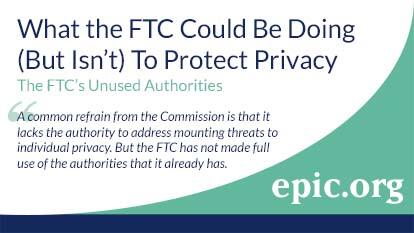Today, EPIC and a coalition of 44 consumer advocacy, civil rights, and media democracy groups urged the Federal Trade Commission to initiate a rulemaking to promote civil rights and protect against abusive data practices. “Companies use personal data to enable and even perpetuate discriminatory practices against people of color, women, members of the LGBTQIA+ community, religious minorities, persons with disabilities, persons living on low income, immigrants and other marginalized groups,” the letter explains. The letter calls for a rulemaking that would address the collection, use, management, retention, and deletion of personal data. "This country faces a deepening crisis of data abuse and discrimination,” John Davisson, Senior Counsel at EPIC. “But the FTC has the power to set industry-wide rules that will rein in exploitative data practices and protect privacy and civil rights. We join the president and members of Congress in urging the FTC to use that power as soon as possible.” EPIC has frequently challenged the FTC over its failure to address consumer privacy harms, has filed a rulemaking petition with the FTC on commercial AI use, and has long advocated for the creation of a U.S. Data Protection Agency. EPIC also published a report on the FTC’s unused statutory authorities, What the FTC Could Be Doing (But Isn’t) to Protect Privacy, in June.
The Senate Finance Committee has significantly scaled back a proposal in the pending budget reconciliation bill to expand the mandatory reporting regime for private financial information in the United States, a move that EPIC and peer organizations called for last month. The original proposal would have required peer-to-peer apps and services to provide the IRS with Tax Identification Numbers and other data for accounts with inflows and outflows of more than $600 per year. Because most individuals do not hold a separate TIN from their Social Security Number, this plan would have forced private entities to collect the SSNs of millions of Americans. The revised proposal raises the threshold from $600 to $10,000, a significant step toward recommendations by EPIC and other privacy and consumer rights groups. “At minimum, the expanded reporting requirement should be scaled back to apply only to business accounts or individual accounts with a high de minimis threshold, adjusted for inflation over time,” the coalition wrote in its letter to the Senate Finance Committee. U.S Treasury Secretary Janet Yellen also praised the change.
In comments on the Office of the Privacy Commissioner of Canada, EPIC urged the Commissioner to ban police use of facial recognition. EPIC's comments respond to the Commissioner's recently published Draft Guidance on Facial Recognition for Police Agencies. The Draft Guidance is a set of non-binding recommendations that would govern how police agencies in Canada use facial recognition technology. EPIC's comments argue that police cannot be trusted with facial recognition, that the Draft Guidance would not prevent abuses of the technology, and that the only privacy-protective approach to facial recognition is a complete ban. EPIC has joined a number of coalitions urging a ban on facial recognition including: an international letter opposing the technology, a statement of concerns on police use of FR, and EPIC's Ban Face Surveillance campaign.




















